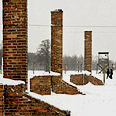
'The others are already up the chimney.' Auschwitz death camp (archive photo)
Photo: Reuters
When his father told Ernest Michel to learn calligraphy, the Jewish teenager never realized that it would later save his life.
But it was his ability to write that earned him a privileged position in the Auschwitz concentration camp -- filling out death certificates -- and later gave him a front-row seat as a reporter at the war crimes trial of Nazis in Nuremberg.
More than 60 years after the execution of many of those Nazi leaders, Michel, who now lives in New York, has forgotten how to speak his mother tongue.
But his memories of entering Nuremberg's Palace of Justice as a 22-year-old on a cold November morning are branded in his mind.
"I found myself in the press gallery together with the top press correspondents from around the world," he recalls, speaking by phone from New York.
"Sitting in the courtroom, 25 feet from me are all the top Nazis on trial for their lives," says Michel.
For Michel, who had been invited to report for the allied forces' German news service, it was the end of a traumatic journey. During the war he spent years as a slave laborer before being sent on a four-day rail journey to Poland.
"We arrived at a place called Auschwitz," he says. "And I noticed one thing -- there was a peculiar sweet smell in the air."
"We were beaten down until we were facing the camp doctor. The thumb went up. The thumb went down. That was the decision if you were going to live or die.
"One of the prison inmates later said: 'You are the lucky ones, the others are already up the chimney,' and that's when we realized what the smell was -- burning bodies."
Broken by camp life, Michel was plucked from the Auschwitz infirmary to write death certificates because of his good handwriting.
As allied forces moved in, he and other inmates were forced on a winter march through Germany.
'I was shaking'
He survived with the help of an SS soldier who ordered him to carry a packet of gold teeth, watches and jewelry snatched from the camp before it was evacuated. Michel later escaped to return to his bombed home in the flattened city of Mannheim, southern Germany.
Roughly two years after his arrival at Auschwitz, Michel's memories came to life again one morning in Nuremberg when the lights were dimmed and a hushed silence fell over the court room.
"The prosecution showed the film of Auschwitz, taken by Russian army photographers," he recalls. "It showed bodies. It showed what I had seen every day. It was Auschwitz the way I lived it."
Soon the journalist, dressed each day in the same oversized suit given to him by a Jewish charity, attracted the attention of neighbors in the press gallery with his reports that appeared in newspapers under the name "former Auschwitz inmate, number 104995."
The defendants sitting beneath also started to take notice. "One day, during a break, a man calls over to me and said: 'I am the defense attorney for Hermann Goering. All the defendants want to know, particularly Goering, who that man is who is writing the articles signed from a former Auschwitz inmate."
An invitation to meet the deputy to Nazi dictator Adolf Hitler followed and days later, a nervous Michel accompanied his lawyer downstairs to the cells.
"I was shaking," recalls Michel, as he entered the Nazi leader's cramped room. Dressed in his old army uniform, a confident-looking Goering stood up to greet his guest.
"Here was Hitler's deputy, who knew everything," says Michel. "In one second I turned and asked the MP to let me out. I never said a single word. I was too upset. The last thing I remember is his face with his hand outstretched. But I couldn't get out soon enough."
Weeks later, Michel rejected the offer of a permanent job with his news agency and boarded a naval carrier to the United States. Among his few belongings were the trousers he wore at Auschwitz and Goering's autograph, given to him by the Nazi's lawyer after their brief encounter.
"I had heard enough," he says. "I made a decision -- I wanted to leave Germany."
Today, Michel has learned to live with wartime memories although bitterness spills over when talking about the Nazis who murdered his parents in Auschwitz, a year before he arrived.
He prefers to invest his energy working for a Jewish charity, the UJA-Federation of New York.
"I probably have more reason to hate Germany and the Germans than anyone else I know," he says. "But you cannot do that. You cannot live with hate -- it destroys you."















